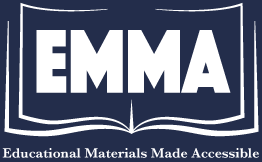OVERVIEW
A search term is required to begin. You may search for matches on the basis of:
- Keyword
- Title
- Creator (e.g., Author)
- Identifier (e.g., ISBN)
The Sort By default selection is Relevancy, and this should be appropriate for most searches.
The remaining filters are all optional:
- Repository: pick one, or default to all repositories
- Page Size: not currently implemented
- Format, Feature, and Accessibility: you may make multiple selections for each control. These will generate matches when ANY of the selected choices matches an item. Note that selections of filters tend to reduce the number of matches.
Search Types
Enter one or more search terms in the search input box, then press the button. (A search term can be a single word or phrase, title, identifier or author name.)
To clear the current search input, click on the "✖" that will appear on the right side of the search input box. This does not result in a new search — it simply clears characters that have been input to help begin a new search.
Keyword search is best for "discovery" of items that you hadn't considered before, but can lead to a large number of results — especially if you give only a single search term, or if your search terms contain many common words.
If you already know that you are looking for a title, or are looking for a specific ISBN, then you can help reduce the number of "false positive" matches by specifying the appropriate search input type.
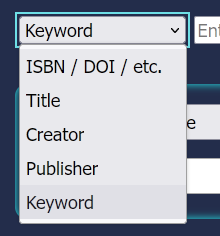
Keyword Search
This search type looks for items matching your search term(s) across a combination of metadata fields (title, author, description, etc).
As a convenience, if a search term appears to be a standard identifier, your keyword search will automatically be converted to an identifier search.
Title Search
Find items whose title matches the search term(s).
For example, a Title search for "King" will return results with the word "King" somewhere in the title, but won't return items by Stephen King.
Creator Search
Find items whose author/creator matches the search term(s).
For example, a Creator search for "King" will return results by an author, editor or composer with "King" somewhere in their name, but won't return items that simply have "King" somewhere in the title.
Identifier Search
Find items whose ISBN, ISSN, OCLC, LCCN, DOI, or UPC matches the search term(s).
Just giving an identifier number alone should be sufficient — however, there are some cases (depending on the numbering scheme) where it may be necessary to prefix the identifier with its type:
Filters
The menu selections below the search input bar either filter out results that are not of interest or control the way that results are presented. (Press Less to reduce the number of filters shown; press More to see all filter selections.)
Filters (also known as "limiters") reduce the result set by eliminating all of the result items that don't meet the filter criteria. For example, setting "Repository" to "EMMA" discards all results from the current search except for items that originate from the EMMA repository.
Simple Filters
These are dropdown menus which can only be set to a single value.
Use this filter to limit results to just those from a specific partner repository.
Multi-select Filters
These are dropdown menus which can be set to multiple values.
Click to drop down the menu selections, then click on a filter value to select it.
This has the immediate effect of eliminating all search results that don't meet the condition imposed by the selection.
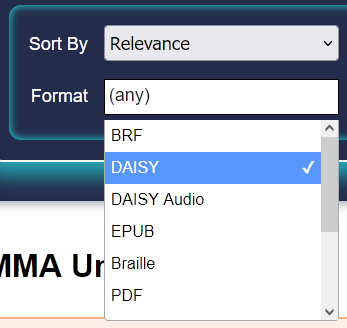
After the dropdown menu closes, your selection will appear as a marker with a leading "✖".
Click on the "✖" to remove the filter value. (This has the immediate effect of re-running the current search without that filter condition.)
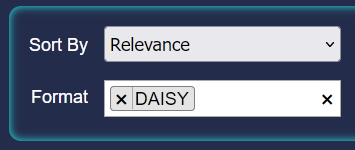
Click in the area outside the marker to cause the menu to drop down again. Select a different filter value, and that will be added to the previous facet selection value.
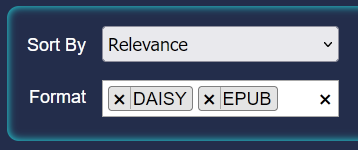
This may cause some additional results to appear, because the multi-select facets use "inclusive-OR" logic — meaning that they allow through items that match at least one of the filter values.
To clear all facet selections, click on the "✖" on the right side of the menu control.
(multi-select)
Limit results to items that have at least one of the selected file formats.
(multi-select)
Limit results to items that have at least one of the selected remediation properties.
(multi-select)
Limit results to items that have at least one of the selected accessibility features.
Search Result Controls
The following menus do not limit the potential set of results you receive; they just control the order and presentation of results.
The default sort shows the result set in decreasing order of relevance, starting with the entries that most closely match the search terms.
NOTE: If search criteria are very broad, then alternate sort orders may bring items to the top that are only marginally useful. Selecting a sort order is most useful when items of a result set are highly correlated by fairly specific search criteria (search terms plus filter selections).
For "Results By File":
Select the number of results per page.
While some search terms may be so specific that the index can eliminate all
but the exactly right entry, more general terms may result in dozens (or
thousands) of results.
This filter gives you control over how large result sets are broken into
easier-to-handle chunks.
For "Results By Title":
This menu is disabled; the number of records acquired from the index is set
to the largest value that can be accommodated.
Search Display Modes
The search index underlying EMMA deals in low-level quantities that correspond to individual files (one entry for every copy of every format for a given title). The default EMMA search display mode takes these raw results and reshapes into a hierarchical view of title-level entries.
In this display mode, search results from the index are aggregated into a set of entries which represent creative works at the title level (as they would be seen at the originating repository. Each entry starts in a collapsed state; click the toggle control to expand it.
Each title-level entry begins with bibliographic metadata that applies to the creative work, followed by one or more collapsible sections. Each section starts in an expanded state; click the toggle control to collapse it.
Each section represents a format in which a copy of the creative work is available (EPUB, DAISY, etc.) and contains remediation metadata and other information which is specific to the file itself.
Some entries may have a more complex structure, comprised of multiple copies of multiple volumes. Each volume will be its own "subtree" with potentially multiple formats, and each format having potentially multiple copies (e.g., unique scans from different originators).
In this display mode there is a one-to-one correspondence between items returned by the index and the search result entries that are displayed on the page. All information for all (file-level) items are displayed fully expanded.
This mode might be useful if you are scanning for information that is not directly searchable by the index's defined search types. In this case, your browser's search-in-page facility can be used to find occurrences of the information directly on the page.
This mode may also be useful if you want search results in JSON format for
automated processing (by appending "&results=file&format=json"
to the URL).
